Freshwater vs. Saltwater Aquarium Equipment: Which Is Better for Your First Tank?
Freshwater vs. Saltwater Aquarium Equipment: Which Is Better for Your First Tank?
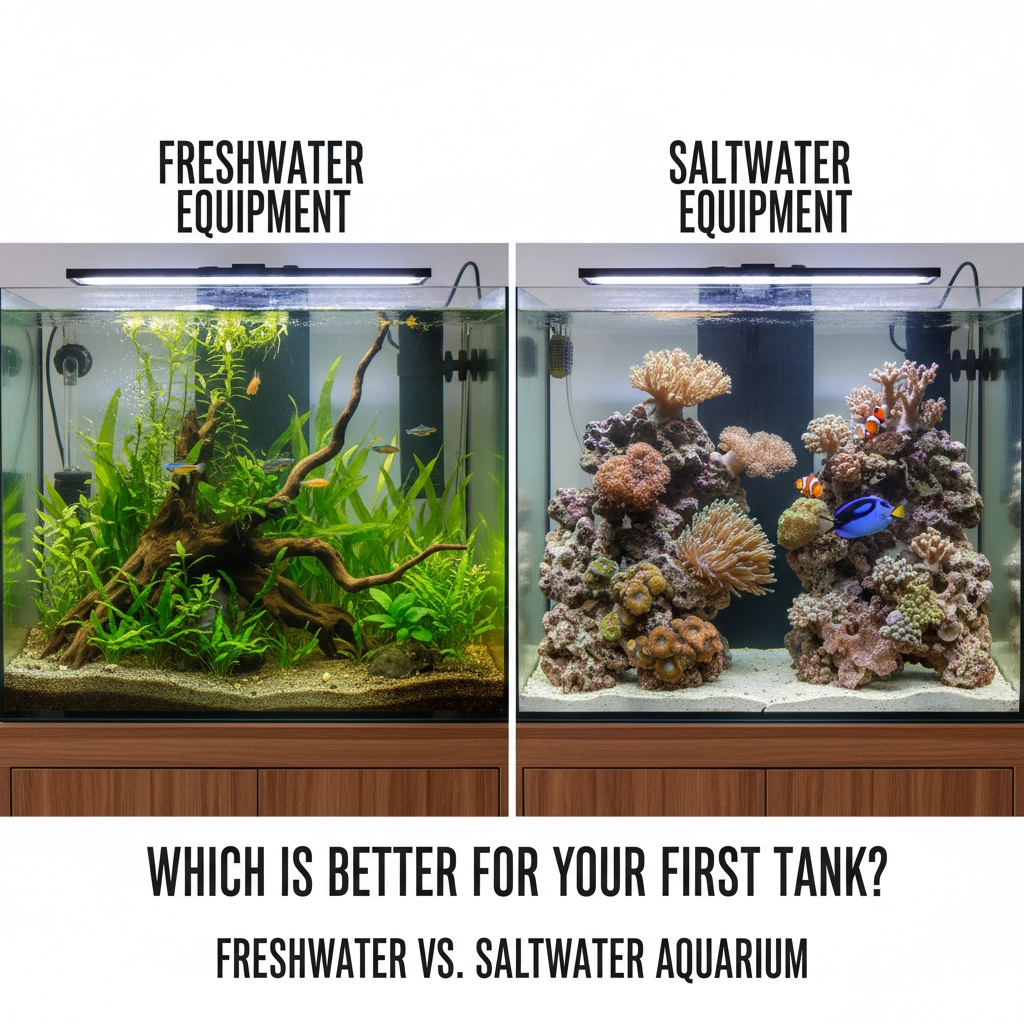
Welcome, budding aquarists! Whether you're a complete newcomer ready to dive into the mesmerizing world of fishkeeping or someone who's been contemplating that first aquatic adventure, you've probably found yourself caught between two captivating paths: the serene simplicity of freshwater or the dazzling allure of saltwater aquariums.
This decision isn't just about choosing fish: it's about selecting the entire ecosystem that will become your underwater masterpiece. The equipment you'll need varies dramatically between these two aquatic realms, and understanding these differences will help you make the perfect choice for your first tank. Let's explore the depths of both options and discover which path will lead you to aquarium success!
The Freshwater Foundation: Simple Yet Stunning
Freshwater aquariums offer an elegant entry point into the hobby, requiring straightforward equipment that won't overwhelm your budget or your technical skills. The beauty of freshwater lies in its forgiving nature: both for your wallet and your learning curve.
Essential Freshwater Equipment
Your freshwater journey begins with just a few key components. A reliable filtration system forms the heart of your setup, with hang-on-back filters or canister filters providing excellent water quality without complexity. These workhorses handle biological, mechanical, and chemical filtration in one convenient package.
Temperature control comes next with a simple aquarium heater, essential for tropical species that thrive in warm, stable conditions. Most freshwater fish flourish between 72-78°F, making temperature management refreshingly straightforward.
Lighting for freshwater tanks can be beautifully basic: standard LED fixtures provide adequate illumination for most fish and live plants. Unless you're planning an intensively planted aquascape, your lighting needs remain modest and budget-friendly.
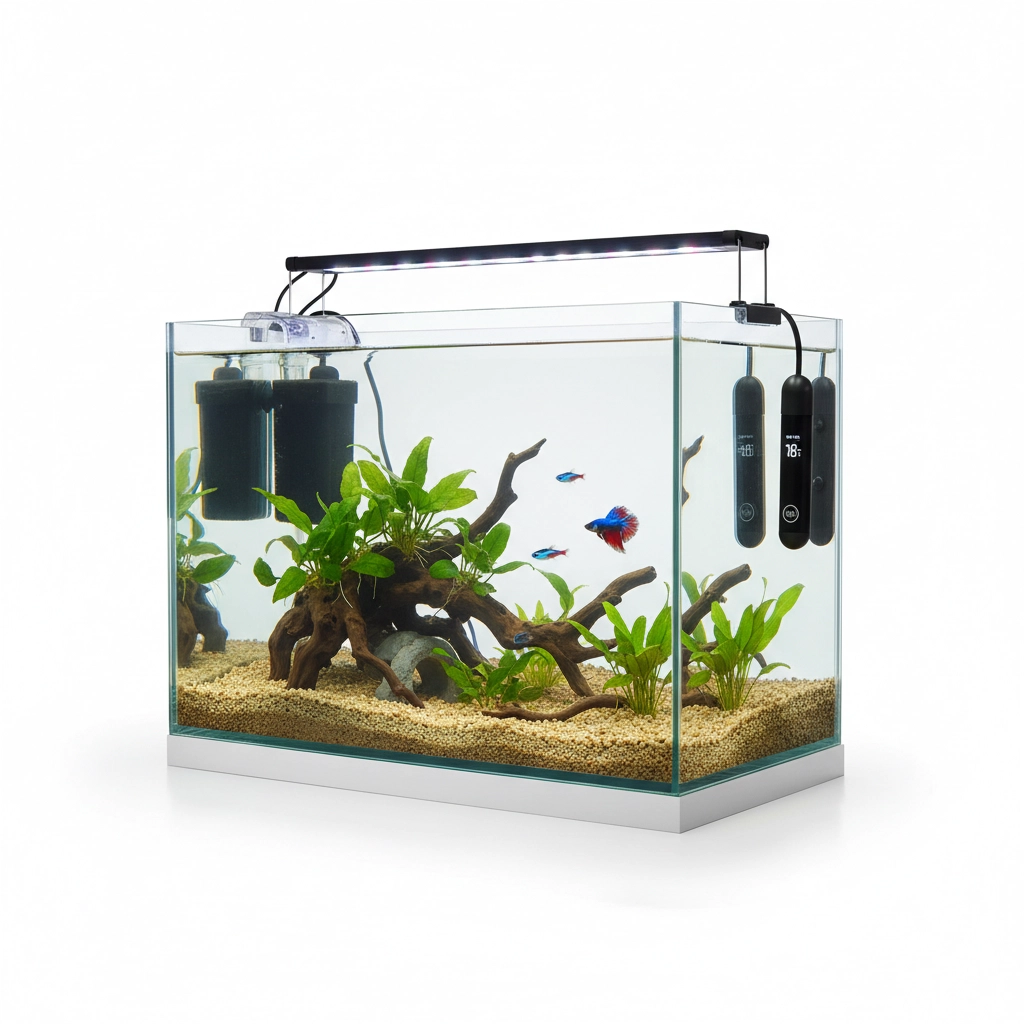
The Freshwater Advantage
The equipment costs for freshwater setups typically range from $100-300 for a complete beginner system, making this an accessible entry point for most enthusiasts. Your maintenance routine becomes manageable with weekly water changes and monthly filter media replacements.
Water parameters in freshwater systems are naturally more forgiving. While you'll still monitor pH, ammonia, nitrites, and nitrates, these levels don't require the precision demanded by marine environments. Basic test kits handle all your monitoring needs without breaking the bank.
Space flexibility is another major advantage: freshwater tanks can thrive in spaces as small as 50 liters, perfect for apartments or smaller rooms. This size flexibility means you can start modestly and upgrade later as your passion grows.
The Saltwater Spectacle: Advanced but Extraordinary
Saltwater aquariums transport you into an exotic underwater world filled with vibrant corals, dazzling fish, and dynamic marine life. However, this aquatic paradise demands significantly more sophisticated equipment and technical knowledge.
Complex Saltwater Equipment Requirements
Your saltwater adventure requires a comprehensive equipment arsenal. Beyond basic filtration, you'll need a protein skimmer: an essential device that removes organic waste before it transforms into harmful compounds. This crucial equipment prevents the buildup of toxins that could devastate your marine ecosystem.
A sump system becomes virtually mandatory, housing your filtration equipment and providing additional water volume. Power heads create the strong water circulation that marine life demands, mimicking the natural currents of ocean environments.
Lighting systems for saltwater tanks, especially reef setups, require high-output LED fixtures specifically designed for coral growth. These specialized lights can cost more than an entire freshwater setup but are essential for maintaining thriving marine life.
Water preparation becomes a science with reverse osmosis/deionized (RO/DI) systems removing impurities from tap water. You'll mix this purified water with specialized marine salt to achieve the precise salinity levels your marine inhabitants require.
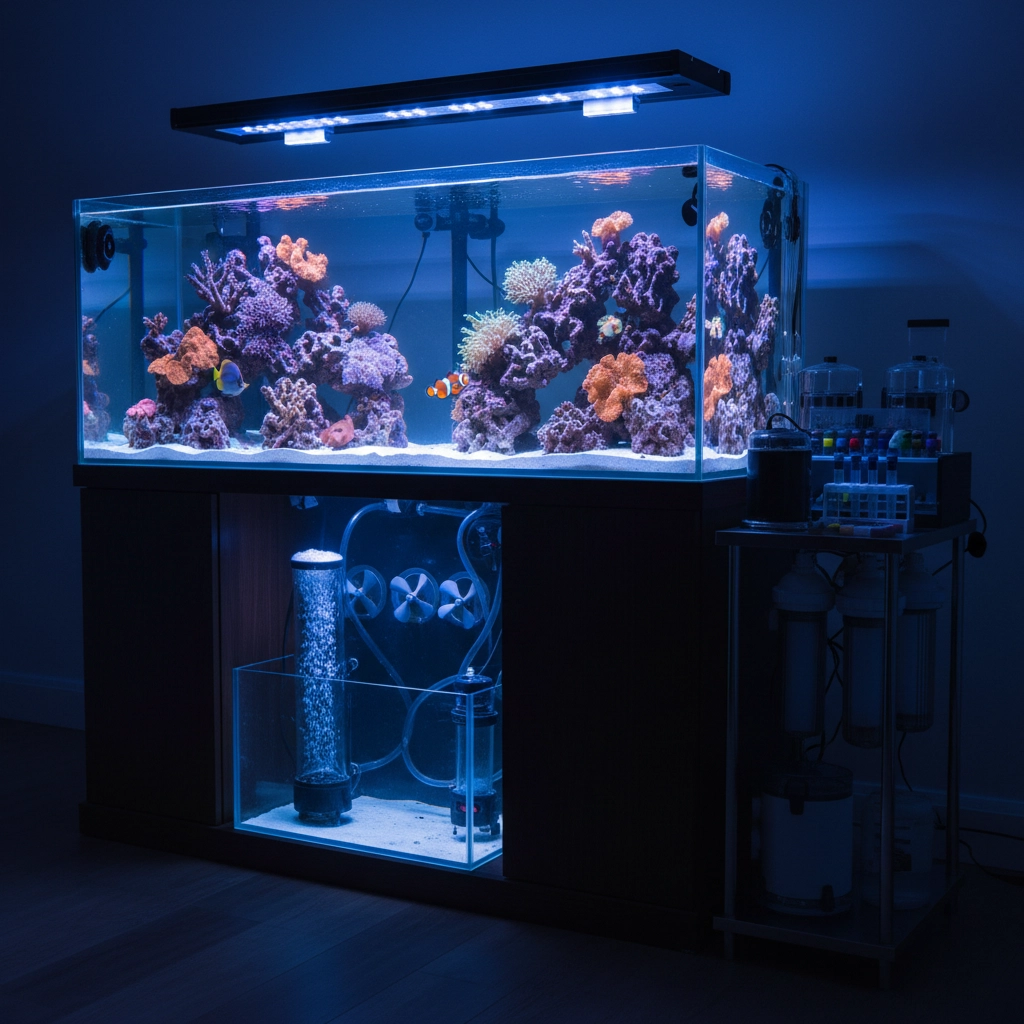
Specialized Testing and Monitoring
Saltwater aquariums demand extensive water parameter monitoring. Beyond basic tests, you'll regularly check salinity with hydrometers or refractometers, monitor calcium levels for coral growth, and track alkalinity to maintain proper pH buffering.
The minimum tank size for saltwater systems typically starts at 300 liters: substantially larger than freshwater requirements. This size provides the stability marine ecosystems need and accommodates the specialized equipment.
Equipment Comparison: Freshwater vs. Saltwater
| Equipment Category | Freshwater | Saltwater |
|---|---|---|
| Initial Investment | $100-300 | $635+ (fish only), $1,200+ (reef) |
| Filtration | Basic canister or HOB filter | Sump, protein skimmer, live rock |
| Lighting | Standard LED (20-30 watts) | High-output marine LED (100+ watts) |
| Water Preparation | Dechlorinated tap water | RO/DI water + marine salt mix |
| Testing Requirements | 4 basic parameters | 8+ specialized parameters |
| Minimum Tank Size | 50 liters | 300 liters |
| Substrate | Gravel ($10-20) | Live sand ($40-80) |
| Maintenance Frequency | Weekly | Daily monitoring, weekly adjustments |
| Learning Curve | Beginner-friendly | Intermediate to advanced |
Making Your Decision: Which Path Suits You?
Choose Freshwater If You're:
- Starting your aquatic journey with limited experience
- Working with a modest budget and want to test the waters before major investment
- Space-conscious with smaller available areas for your tank
- Seeking immediate gratification with faster setup and stocking timelines
- Preferring lower maintenance commitments in your busy schedule
The freshwater industry represents approximately 92% of the aquarium hobby, demonstrating its accessibility and widespread appeal among aquarists of all levels.
Choose Saltwater If You're:
- Fascinated by marine life and coral ecosystems
- Ready for technical challenges and enjoy learning complex water chemistry
- Committed to larger initial investment for long-term rewards
- Passionate about exotic species that only thrive in marine environments
- Willing to dedicate time to daily monitoring and maintenance
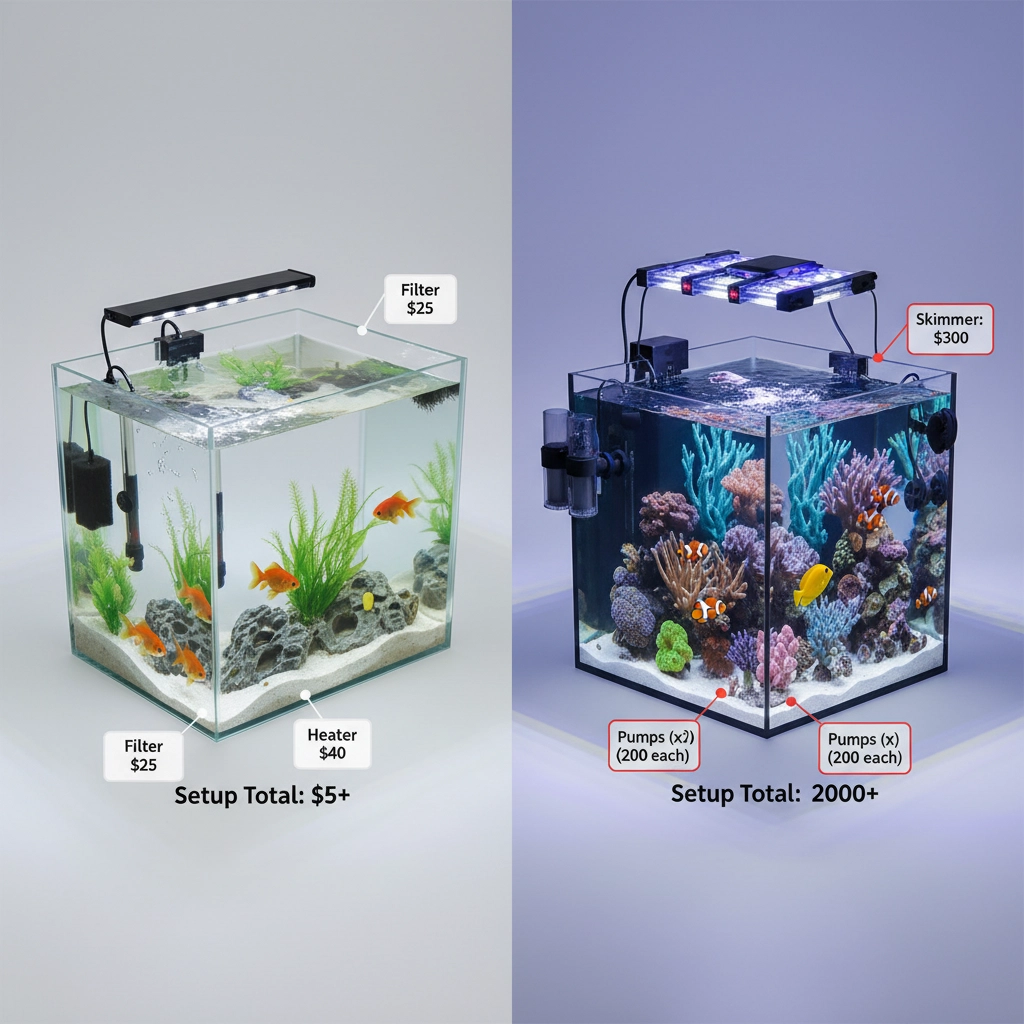
Cost Analysis: Beyond Initial Setup
While initial costs favor freshwater dramatically, ongoing expenses tell a deeper story. Freshwater aquariums maintain lower operational costs with affordable fish, basic food, and simple replacement parts.
Saltwater systems demand higher ongoing investments in specialized foods, replacement equipment, and livestock. Marine fish typically cost 3-10 times more than freshwater species, with some rare specimens commanding hundreds of dollars each.
However, saltwater enthusiasts often find these costs worthwhile for the stunning visual impact and unique species diversity available in marine systems.
The Verdict: Your First Tank Decision
For your inaugural aquatic adventure, freshwater equipment offers the superior starting point. The simplified equipment requirements, forgiving water parameters, and modest budget demands create an ideal learning environment where you can develop essential aquarium skills without overwhelming complexity.
Freshwater systems allow you to focus on fundamental concepts like water changes, feeding schedules, and fish behavior without the added pressure of maintaining precise marine chemistry. This foundation proves invaluable whether you eventually transition to saltwater or continue exploring freshwater's surprising diversity.
Once you've mastered freshwater aquarium management: typically after 6-12 months of successful fishkeeping: you'll possess the knowledge and confidence to tackle saltwater's more demanding requirements if marine life calls to you.
Remember, there's no "wrong" choice in aquarium keeping. Freshwater systems offer their own captivating beauty, from planted aquascapes that rival underwater gardens to vibrant cichlid communities that display fascinating behaviors. Your perfect aquatic oasis awaits, regardless of which path you choose!
Ready to dive deeper into your aquarium journey? Follow us on social media for daily inspiration, expert tips, and community support! Have questions about your setup? Don't hesitate to reach out: our team loves helping fellow aquarists succeed. Share photos of your aquarium progress with us using #AquariumEnthusiastsCommunity for a chance to be featured in our growing community of passionate fishkeepers!
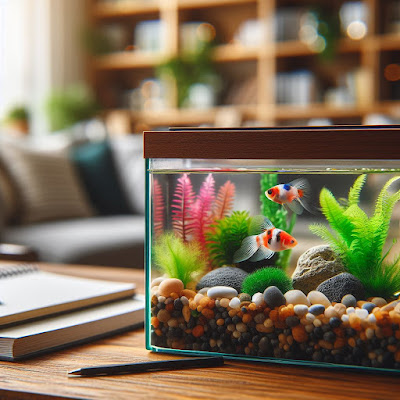



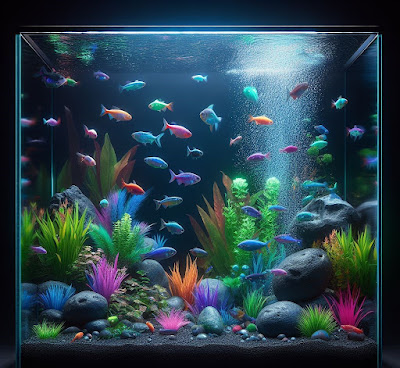



.png)
